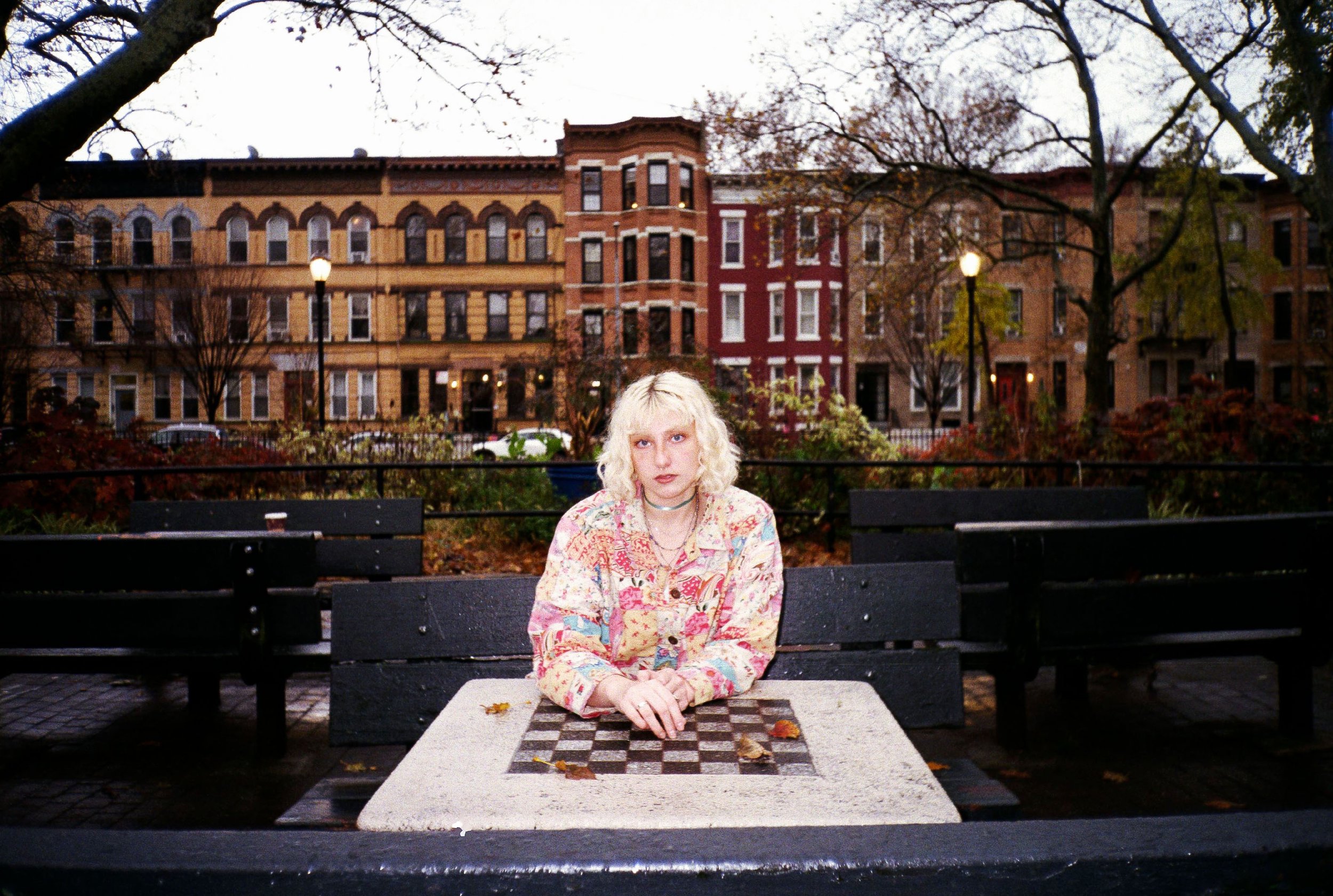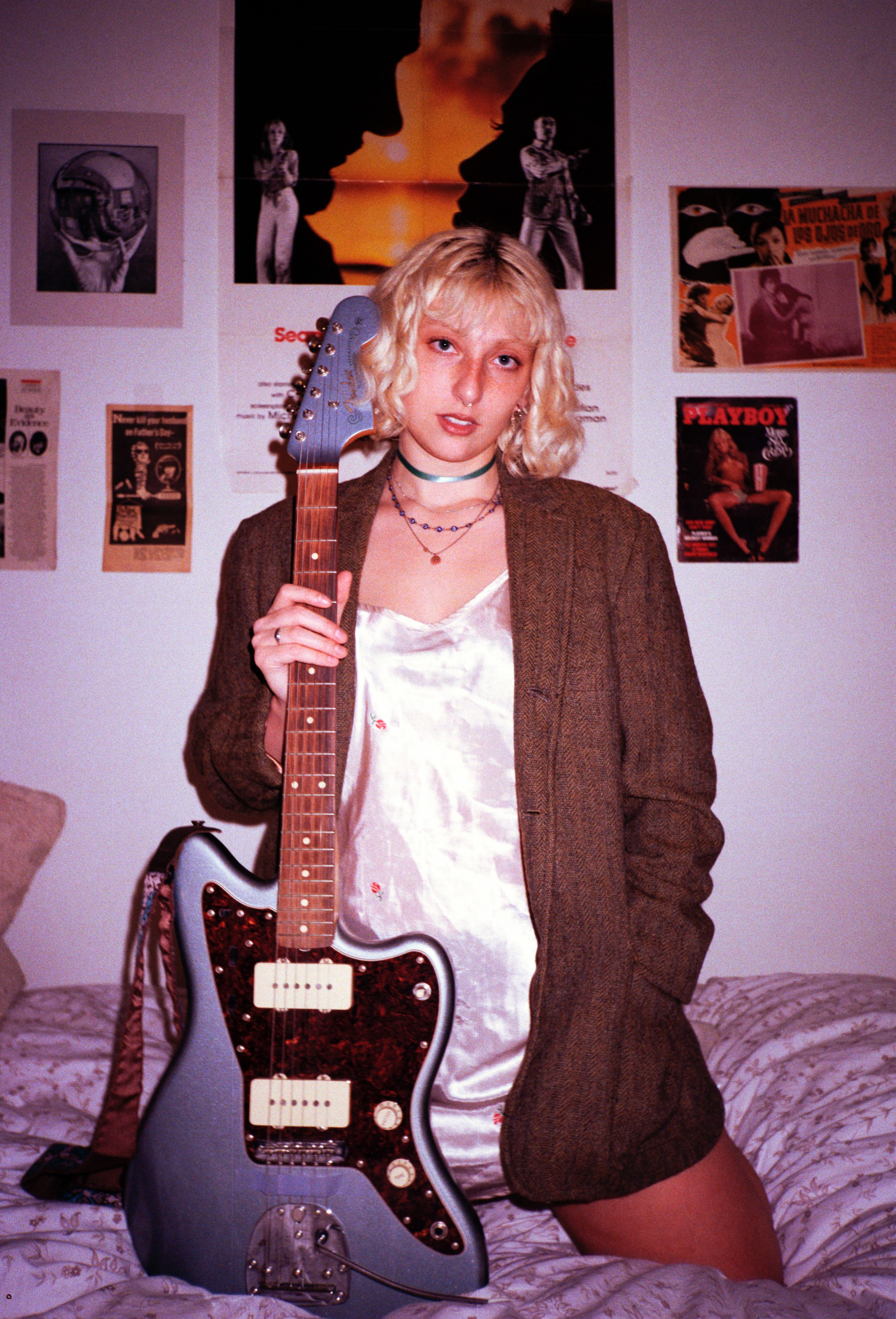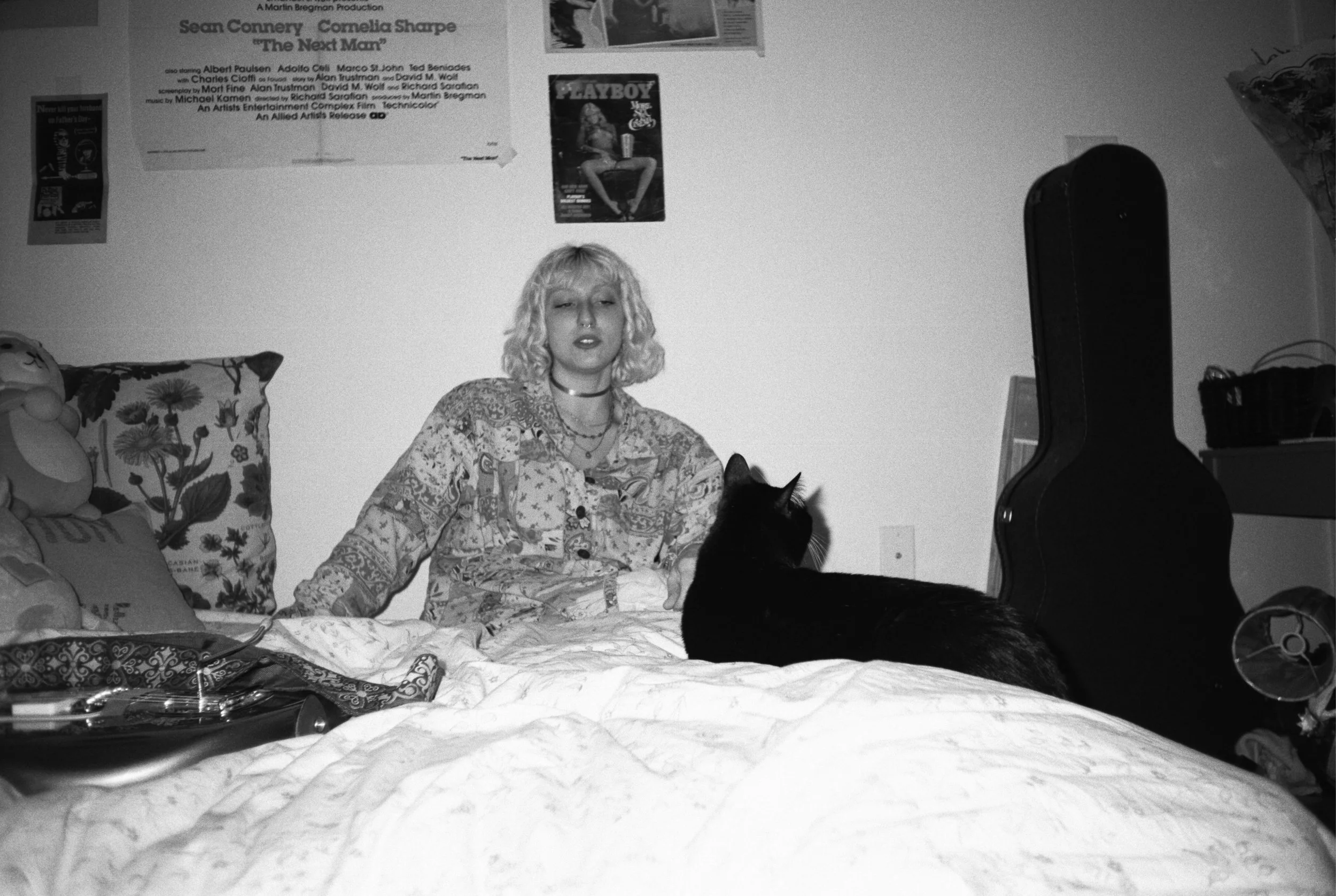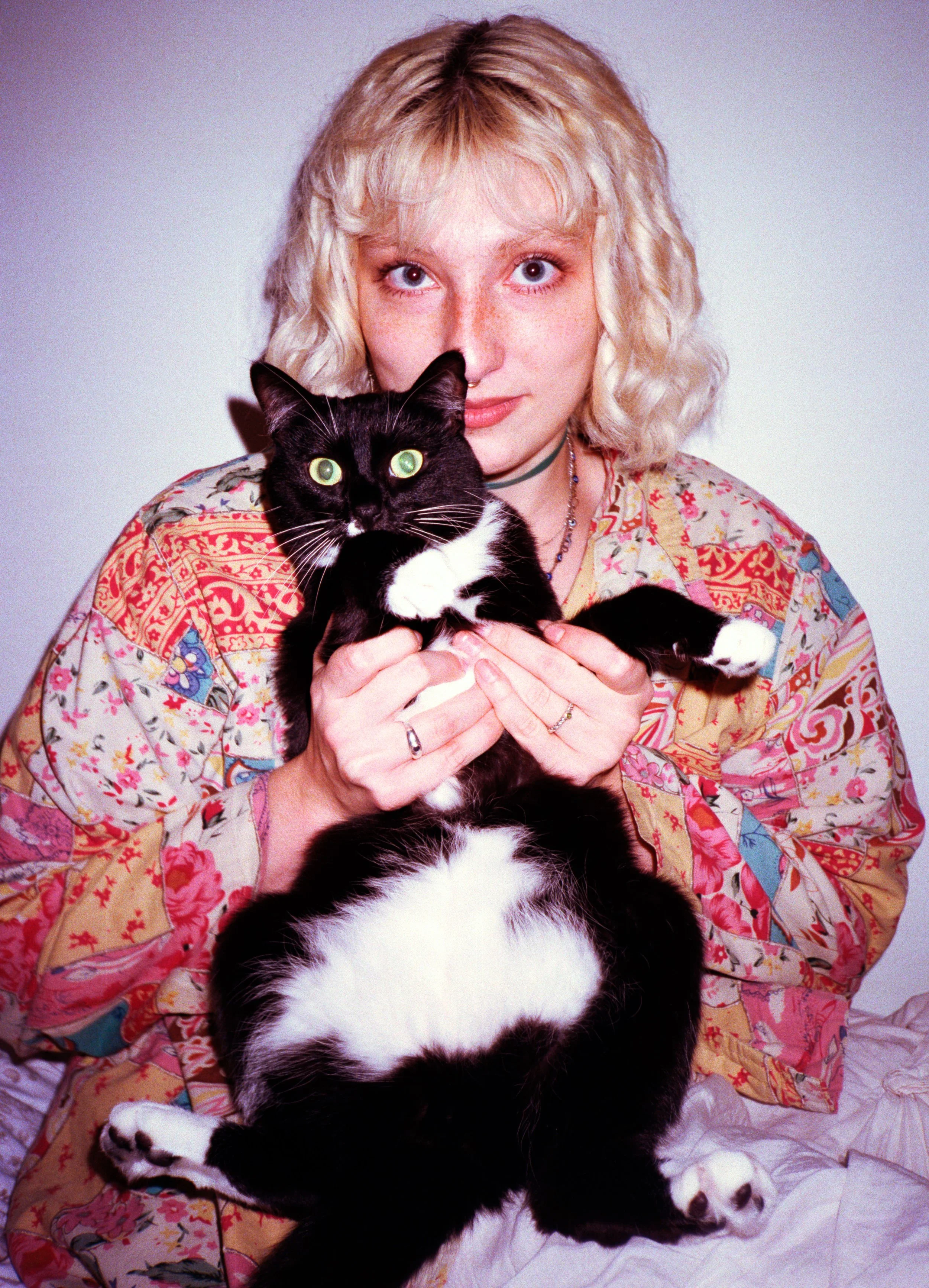Watch Me Scream: A Conversation With Trophy Wife
by Hanna Marchesseault | @hannaaa.m
photos by Erina McSweeney | @erinamcsweeney
Trophy Wife, the musical persona of 23-year-old McKenzie Iazzetta, is no stranger to the confusion and pain that comes along with being a young person — the feeling of constantly being watched, while scrutinizing herself even closer. Overanalyzing every detail of what it means to be a woman.
Iazzetta’s latest EP, “Voyeur,” was released on November 15th. A voyeur gains sexual pleasure from watching people naked or engaged in sexual activity – often relishing in any pain or distress visible in others. To be a human, to be a woman, is to be your own voyeur. Looking down on your pain, your brain, and making sure it can still be packaged beautifully enough.
Listening to the five-track project is like finding a key to her diary and taking a peek inside. She opens the EP urging you to “Come in and ask how [she] is so [she] can lie to you,” and ends the project as a whole with guttural screaming. It’s a man-made catharsis with an outstretched hand pulling you in to feel it all.
I sat down with Iazzetta at the end of November to talk about the release of the EP, her background and inspirations, and what to expect from Trophy Wife next.
Hanna: Where did you grow up?
Trophy Wife: I grew up in Connecticut. So, I was pretty much here until I went to college. I grew up in Newtown. It's kind of rural — we’ve got cows and stuff. I love cows. Very little, quiet place in Connecticut.
H: I know you went to Berklee. Did growing up in Connecticut, in a very rural area, push you into wanting to make music? How has this influenced your musical style?
TW: Honestly, I have no idea. I started out doing music in school taking music lessons, and I went through a million instruments when I was a kid. When I got into middle school, I started doing musical theater for a while, and then choir. For a while I was only singing jazz. So, I just kind of took whatever I could get when it came to music. In Newtown, there's not a huge [music] scene here. So, my background came from clubs in school, and choir — and, obviously, just listening to a lot of music.
H: When you applied to Berklee, were you originally going for Jazz?
TW: Originally, yes. I ended up graduating with a degree in pro music, which is a conglomerate of a lot of things. I focused on songwriting and performance, so I didn’t even end up doing the jazz vocal path.
H: With your project Trophy Wife, how did that come together?
TW: I started the project in 2018 when I got to college — pretty much right when I got there. I was like, “Oh no! Everybody else seems to be writing songs, I should probably get on that.” So, that's when I started writing in the first place. I was really figuring a lot out. I released some stuff at that time that doesn't really sound like me anymore. I guess about a year and a half ago is when we really started, and I got together with my band. From there, we then released “Bruiser.”
H: Have you always been a writer, or did this truly come about just in college? When I listen to “Voyeur,” I think, “Oh, this person is a writer. This is poetry.” To me, I would assume you would have been writing your whole life.
TW: I tried a few times in high school, and just decided I wasn't any good. So, I didn’t ever write a full song, and then I got to college and the first one came about in my dorm room. I was like, “Oh, yeah, it seems like I should do this.” I just always figured I wouldn't like it, or that I wouldn’t be any good, but I pushed myself to do it. My first song that I wrote was “Knife Fight.”
H: Which is such a good song.
TW: Thank you! It came out first as “Guts” and sounds completely different. That’s how I wrote it at the time. It’s funny how much it changed.
H: Did being in Boston and at Berklee affect your music more so than being back in Connecticut?
TW: I only ever wrote when I got to Boston, so I think that being at Berklee and surrounded by other musicians where I’m the little fish again was very good. For me, I think that it's way better to be surrounded by people who are better than you all the time, rather than feel good about what you're doing all the time. I think that it pushed me to [make music], and it made me realize that I need to care. Berklee and Boston gave me a lot of artists who are my peers to look up to, and take creative advice from. Because I'm friends with so many songwriters, we can all listen to each other's stuff, and encourage each other — be proud of each other.
H: You met your band members at Berklee, as well?
TW: Yeah, we all went to Berklee. My bandmates are Mario Perez on guitar, Christian Pace on bass, and Michael Martelli on drums. Michael is still at Berklee, actually — he’s a baby.
H: Now that you’re living in New York, how has that been and what made you want to make that move?
TW: I grew up close to New York. I feel like with Connecticut, half of your city is Boston and half is New York, and I think that for me I just was in Boston long enough. I needed a change of scenery, and I like how late things are open, and being able to go out and find a new thing every single day. I just like that there’s always something going on. In the end, though, I do miss Boston. I became a person there. I don’t think it would have been good to throw myself into New York at 18 years old.
H: Let’s get into the EP. How did the name of this project come about? What does the word “voyeur” mean to you, and how does it relate to this music?
TW: It kind of started out as a joke when we were mixing stuff, and I was still trying to brainstorm names. So, when it came up somehow in conversation, I was like, “Oh wait, that’s kind of great.” The name itself means a lot of stuff. It's funny to come up with it, and then realize what it means afterwards, but that's kind of what happened. I feel like a lot of the lyrics that I write are almost coming at myself, like I'm watching myself. I'm watching painful and confusing things happen to me. I’ve talked about this with some of my friends, and I feel as if sometimes you end up watching yourself and being your own voyeur. There’s somebody in your head watching you. You could be by yourself laying down biting your nails, and you're like, “Oh, wait, how am I doing this? Am I pretty doing this? Do I look good?” And I think that there's a lot of that in the EP — in the way that I feel like I write, in the way that I reflect. Which isn't necessarily good or bad, but it's just something that I think about.
H: It was interesting listening through, because I feel like as humans we can sometimes take pleasure in our own pain. When something bad happens we like to sit in it, pity ourselves, take pictures of our tears and post it on social media. The EP, as whole, felt very poignant in the way we like to watch this pain in ourselves and others, but we sometimes don’t do anything about it.
TW: It’s also just deeply embedded in the womanness of, “Am I suffering beautifully enough?” I feel like women’s pain is often twisted into something that has to be pretty, beautiful, dainty — becoming something that can be commodified. Everything we do has to be for someone else.
H: When did you start writing this EP?
TW: Honestly, a long time ago. I didn't start [writing the EP] thinking it was going to be one unit. I wrote “Linoleum” about three years ago now, and I wrote “Ask Me Anything” about two years ago. So, it's kind of been a long time coming, but I didn't necessarily know I was going to put them all together.
H: Over these three years, have the tracks changed a lot?
TW: They've stayed pretty much the same. When I write, I kind of don't share it with anyone until it's completely finished — until there's nothing left to be poked at. Once I bring it to my band, and we start to make it a real song, versus something that I'm doing alone in my dark room. That's when everything starts to really change and come to life. It was a really long time before I brought “Linoleum” to my band. They all have huge brains, and they made it into something that was really cool, and something I would never have picked out from it.
H: Does your band ever write with you?
TW: I write by myself. If I’m in a room writing with anyone, I feel like I censor myself too much.
H: Listening to the EP, it feels like a diary entry of sorts. It’s deeply intimate. So, I’m sure writing with someone who doesn't have the same brain as you could be really stifling. Out of the whole EP, a track that feels most connected to the term “voyeur,” to me, is “Leech.” Do you mind explaining that song, and the production behind it?
TW: This track is our freak baby. I must have been in a bad mood when I was writing it, and when I brought it in, we didn’t really know what to do with it. It took us so long to figure out where we were going with it, what category to put it in. We ended up using a lot of synth instruments, and an electronic drum, which was new because normally all of our instruments are live. We just wanted to make it creepy. It’s a really cathartic song, and after we recorded it, I felt like it needed more. I needed to yell on it, so we added the screaming at the end. We recorded it as a voice memo in a basement — me, Alli Raina from Paper Lady, and Maggie Farren. We all just screamed into my phone until we got how I wanted it to sound. The chorus is where I started with the song, just that feeling of needing to completely let go of your control over something. Wanting someone to just direct you, not having to think for yourself for a moment. Yet also that extreme need to feel control of every single situation. I was writing wanting both of those things. To be in control, but to completely let go of it all.
H: For an album that centers around pain, and how you react and view yourself amidst that pain, the screaming at the end is perfect. It’s like letting go. It’s the thesis statement of the whole album, to me. Which track off the EP is your favorite?
TW: I think my most fun favorite is “Linoleum.” I really love playing that live. It's so much fun. We had so much fun trying to put it together. I actually wrote it for a class, and I think it forced a song out of me that I ended up really liking. I like “Ask Me Anything” because it’s the oldest one we’ve been playing. It feels really comforting. We love to open with it because it gets us in the headspace of wanting to perform. We tried to change it up for a show, and we immediately were like, “Nope, we need to go back to performing [‘Ask Me Anything’] first.”
H: Making art of any kind is such an intimate experience, and can feel so personal to just you. When you’re writing your songs, are you writing with a listener in mind, or just writing for yourself and hoping it lands amongst your audience?
TW: I usually write for myself, and hope that people resonate. I feel like I'm always writing a letter to previous McKenzie — that she would never listen to if she heard it, right? I don’t even think I’m doing that when I’m writing, but that's always what ends up happening.
H: Would previous McKenzie back in Connecticut believe it if she knew what you were doing now?
TW: I had no idea when I left high school what I would be doing, but now I can’t imagine doing anything else but this. So, I don’t know if at the time she would believe me.
H: The EP art is really beautiful. Who shot that photo for you?
TW: It was my friend Gia Kelliher. That was when we were actually recording my last EP, “Bruiser.” She came along for moral support, and the place that we recorded at was a farm. There was a house on it that was being renovated, but that's where the bathroom was — we'd have to climb through this renovated house. Everything was being painted, and it just simply was not a real house. We would go in there though, and one day we were going through and she had brought her film camera, and she was like, “You need to lay on the floor because there's light coming in through that window.” It was very much not a planned photo shoot.
H: What made you pick this photo for the EP then?
TW: We were going through a couple of them when choosing the single art for “Linoleum,” and I just ended up really liking all of the photos. I feel like it connected once we came up with the title “Voyeur.” I don’t know, I think the vibe of the EP is “laying down on the floor.” In that photo it feels like you’re watching me, and I don’t know that you’re there.
H: Do you have any plans for going on tour with this EP? Any shows coming up where you’ll be playing the songs?
TW: We have shows booked through April, but we don’t have a tour booked at the moment. For right now, we’re just playing the songs and promoting the EP as we have shows.
H: What are your plans for Trophy Wife in the future? Goals you want to hit, art you want to create, people you’d like to collaborate with?
TW: Right now our favorite part about all of this is getting to meet new people who are listening to us, but also we get to meet so many artists just by having the privilege of playing shows. We get to meet new people every single time, and see how they perform, and that really inspires me. That’s my favorite part and what I want to continue doing. We played Paradise Rock Club last week, and it was the most people I’ve ever played for. Getting to meet that many new people was crazy, and I just want to continue doing that.
You can stream “Voyeur” on Spotify, Apple Music, or wherever you listen to music. Follow Trophy Wife on Instagram, and get out to a show near you.





